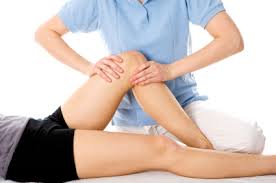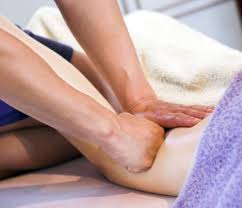Therapeutic Sports Massage
Therapeutic sports massage is a type of massage technique that focuses on treating soft tissue aches, pain and injuries that are associated with recreational activities. Massage can reduce muscle stiffness and improve relaxation by reducing heart rate and blood pressure.

Anyone who routinely stretches their physical limits through movement such as running, cycling, hiking, swimming, dancing, tennis and other racquet sports, strength training and aerobics can benefit from a massage. There are others who does strenuous activities in a day that is not normally classified as exercise. Examples are mothers with small children, gardeners, and others who use their bodies strenuously in their work.
Incorporating massage in your conditioning program has many benefits. It helps you get into good shape faster, and with less stiffness and soreness. It helps you recover faster from heavy workouts, and relieves conditions which may cause injury.
The Benefits of Sports Massage
- Reduce the chance of injury, through proper stretching and event preparation, and through deep tissue massage
- Improve range of motion and muscle flexibility, resulting in improved power and performance
- Shorten recovery time between workouts
- Maximize the supply of nutrients and oxygen through increased blood flow
- Enhance elimination of metabolic by-products of exercise
To Schedule your Massage
Call or Text (307) 413-1961
Sports Massage Pricing
| 1 Hour { Out-Call* / Office } | $150* / $135 |
| 1 1/2 Hours { Out-Call* / Office } | $220* / $200 |
* In-Home Travel Fees (Per therapist, not per massage)
Town of Jackson an additional fee of $35 applies. Anywhere outside the town of Jackson an additional $55 applies.
FAQ’s
What Happens When You Exercise?
Regular exercise increases vigor and promotes a general sense of well-being. If done in moderation, it can help relieve the effects of stress, and has been linked to decrease in psychological depression. It also produces positive physical results like increased muscular strength and endurance, more efficient heart and respiratory functioning, and greater flexibility.

Conditioning involves three steps or phases:
- Tearing Down Phase – pushing to your physical limits
- Recovery Phase – key for the rebuilding
- Buildup Phase – when the system adapts to the new demands
The ‘tearing down’ phase of the adaptation process often involves stiffness and soreness, especially when the amount of movement is significantly increased from what the body has been used to in the past.
Delayed muscle soreness (24-48 hours after exercise) may be caused by any of a number of different factors. Some possible causes are minor muscle or connective tissue damage, local muscle spasms that reduce blood flow, or a buildup of waste products (metabolites) from energy production.
Heavily exercised muscles may also lose their capacity to relax, causing chronically tight (hypertonic) muscles, and loss of flexibility. Lack of flexibility is often linked to muscle soreness, and predisposes you to injuries, especially muscle pulls and tears. Blood flow through tight muscles is poor (ischemia), which also causes pain.
How Does Massage Help?
Recovery
Therapeutic massage helps the body recover from the stresses of strenuous exercise, and facilitates the rebuilding phase of conditioning. The physiological benefits of massage include improved blood and lymph circulation, muscle relaxation, and general relaxation. These, in turn, lead to removal of waste products and better cell nutrition, normalization and greater elasticity of tissues, deactivation of trigger points, and faster healing of injuries. It all adds up to relief from soreness and stiffness, better flexibility, and less potential for future injury.
Muscle Flexibility
The overall objective of a maintenance program is to help the athlete reach optimal performance through injury-free training.
